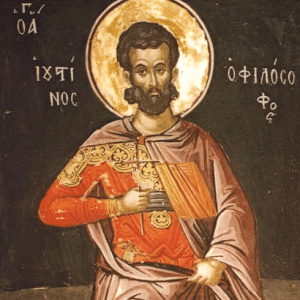
St Justin Martyr was a an early Christian philosopher and martyr. He converted to the Catholic Faith from paganism and Greek philosophy.
Read the full St Justin Martyr novena on the novena page. You can also learn more about novenas here.
Who Was Saint Justin Martyr?
St. Justin Martyr was born around 100 AD in Flavia Neapolis, a town in Samaria, which is now Nablus in the West Bank. He was born into a pagan family, and his early education was deeply rooted in the classical Greco-Roman traditions.
He studied various philosophical systems, including Stoicism, Peripateticism (Aristotelianism), Pythagoreanism, and Platonism. His profound intellectual curiosity and pursuit of truth eventually led him to Christianity.
Justin’s conversion to Christianity was a gradual process influenced by his philosophical inquiries. Around 130 AD, he encountered an old Christian man who engaged him in a dialogue that left a lasting impression on him.
This conversation, coupled with his dissatisfaction with the inadequacies of pagan philosophies to answer life’s ultimate questions, led him to embrace Christianity. He saw Christianity as the fulfillment of the highest philosophical truths and the only source of true knowledge about God and the universe.
After his conversion, Justin became an ardent defender and apologist of the Christian faith. He traveled extensively, teaching and debating both in public forums and in private gatherings.
He eventually settled in Rome, where he established a school of Christian philosophy. Here, he continued to engage with both pagans and Jews, defending Christianity against various criticisms and misconceptions.
Justin is best known for his writings, particularly his two Apologies (First Apology and Second Apology) and the Dialogue with Trypho.
First Apology
Addressed to the Roman Emperor Antoninus Pius, it seeks to defend Christians against false accusations and to argue for the rationality and moral superiority of Christianity. Justin outlines the principles of Christian worship and belief, and he criticizes the persecution of Christians.
Justin Martyr affirmed the belief in the Real Presence of Christ in the Eucharist. He stated that the bread and wine used in the Eucharistic celebration are not ordinary food and drink but become the body and blood of Jesus Christ. In First Apology, Chapter 66, he writes,
For not as common bread and common drink do we receive these; but in like manner as Jesus Christ our Savior, having been made flesh by the Word of God, had both flesh and blood for our salvation, so likewise have we been taught that the food which is blessed by the prayer of His word, and from which our blood and flesh by transmutation are nourished, is the flesh and blood of that Jesus who was made flesh.
Second Apology
A shorter work, it further defends Christianity and responds to specific accusations against Christians. It emphasizes the moral integrity and philosophical depth of Christian teachings.
Dialogue with Trypho
This is an account of a debate with Trypho, a Jewish philosopher. It presents a detailed argument for Christianity as the true fulfillment of Judaism, interpreting the Hebrew Scriptures as pointing to Jesus Christ.
Justin’s outspoken defense of Christianity eventually led to his arrest during the reign of Marcus Aurelius.
He and several of his students were brought before the Roman Prefect Rusticus. Refusing to renounce his faith, Justin was condemned to death.
Around 165 AD, he was scourged and beheaded, thus earning the honor of martyrdom.
St. Justin Martyr is venerated as one of the earliest and most significant Catholic apologists.
His works provide invaluable insights into the beliefs, practices, and challenges of the early Church.
His intellectual approach to faith and reason has influenced Christian thought throughout the centuries.
St Justin’s commitment to seeking truth, his defense of Christian doctrine, and his ultimate sacrifice have left a lasting legacy in Christian history, making him a pivotal figure in the development of Catholic apologetics.